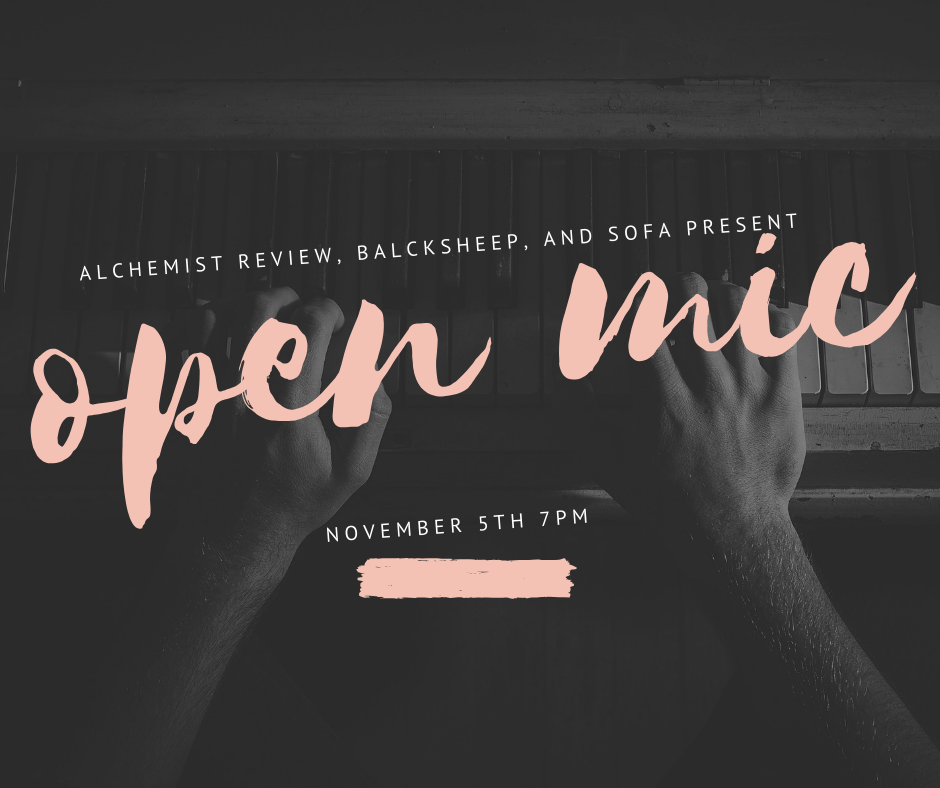Make sure to get your best works to us by our email! We look forward to your beautiful images. Thank you for trusting us with your work.
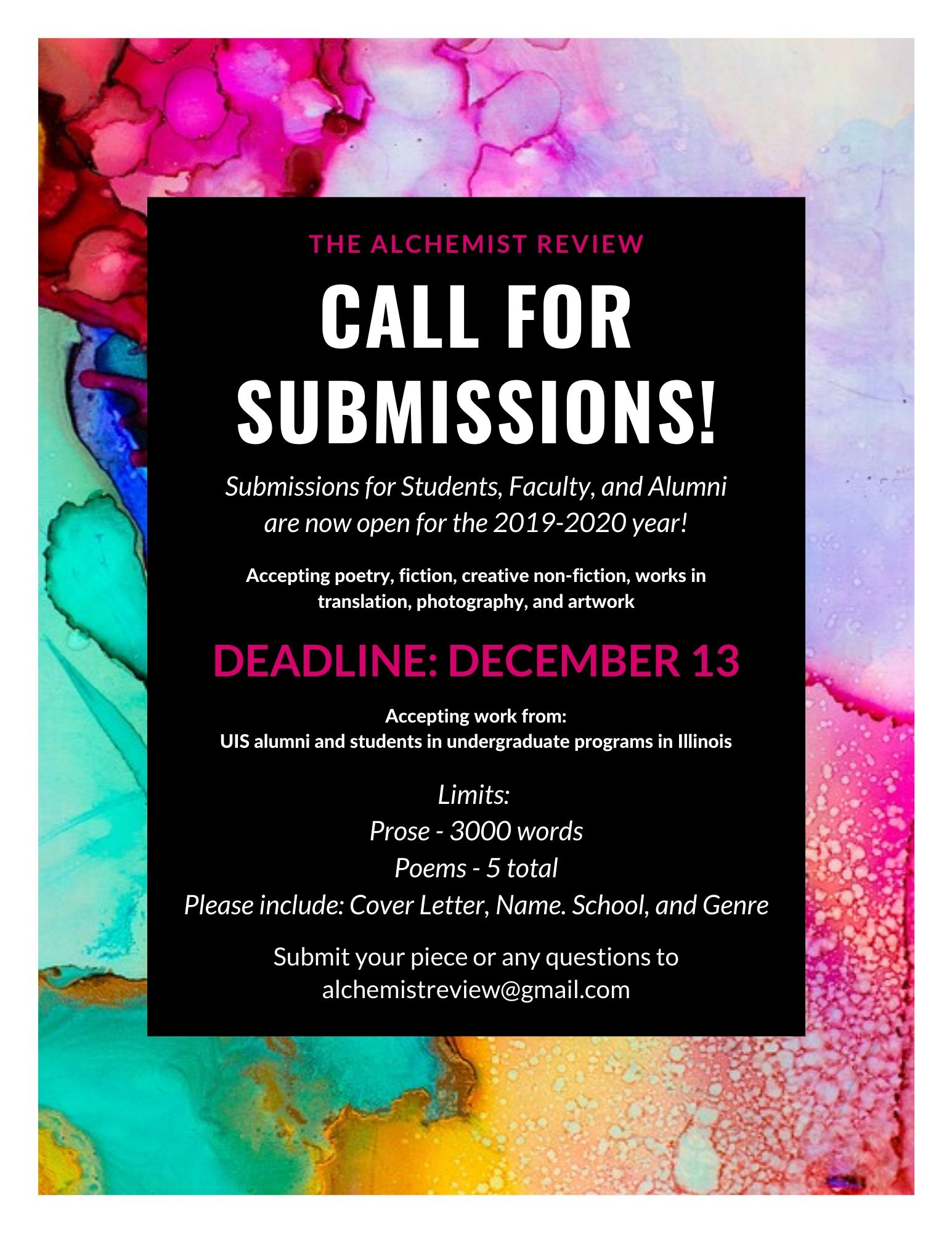
Make sure to get your best works to us by our email! We look forward to your beautiful images. Thank you for trusting us with your work.

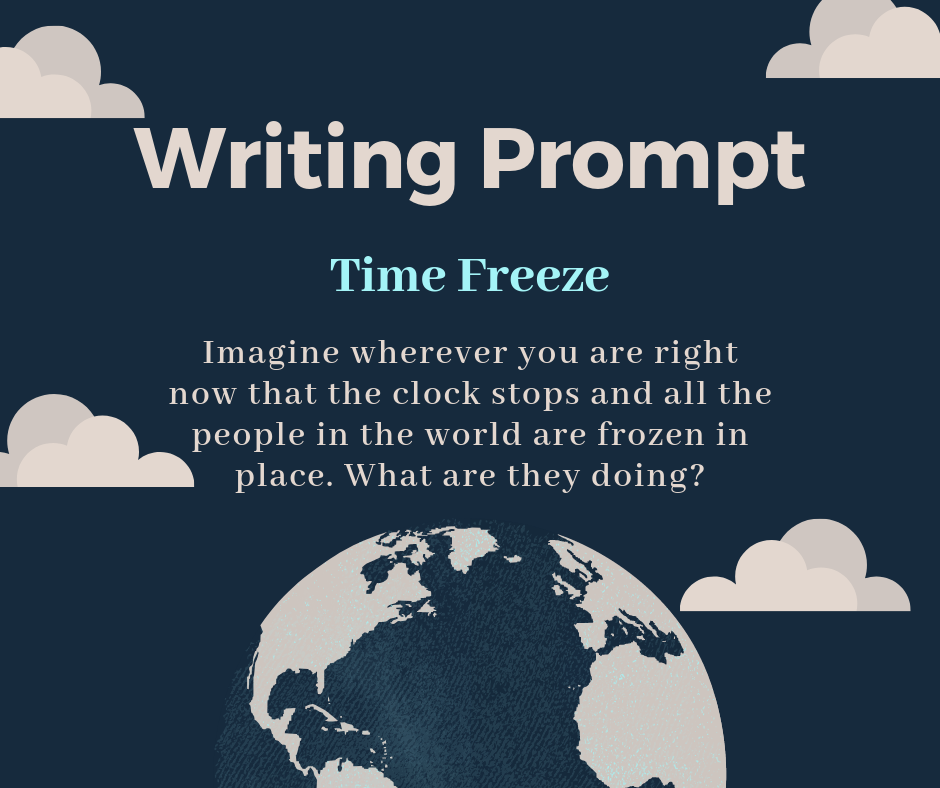
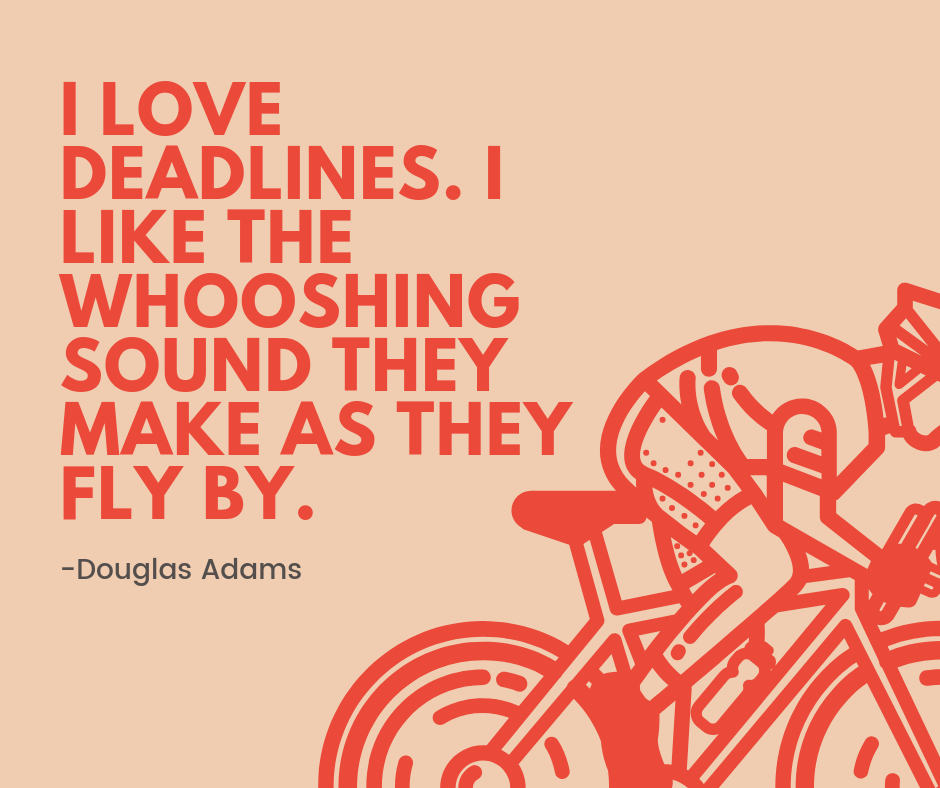
We love making zines and promoting feminism! The two just so happen to go hand in hand together, so we decided to host an event celebrating them! Alchemist Review is doing this in with another group on campus, Planned Parenthood Generation Action! More pictures to come!!
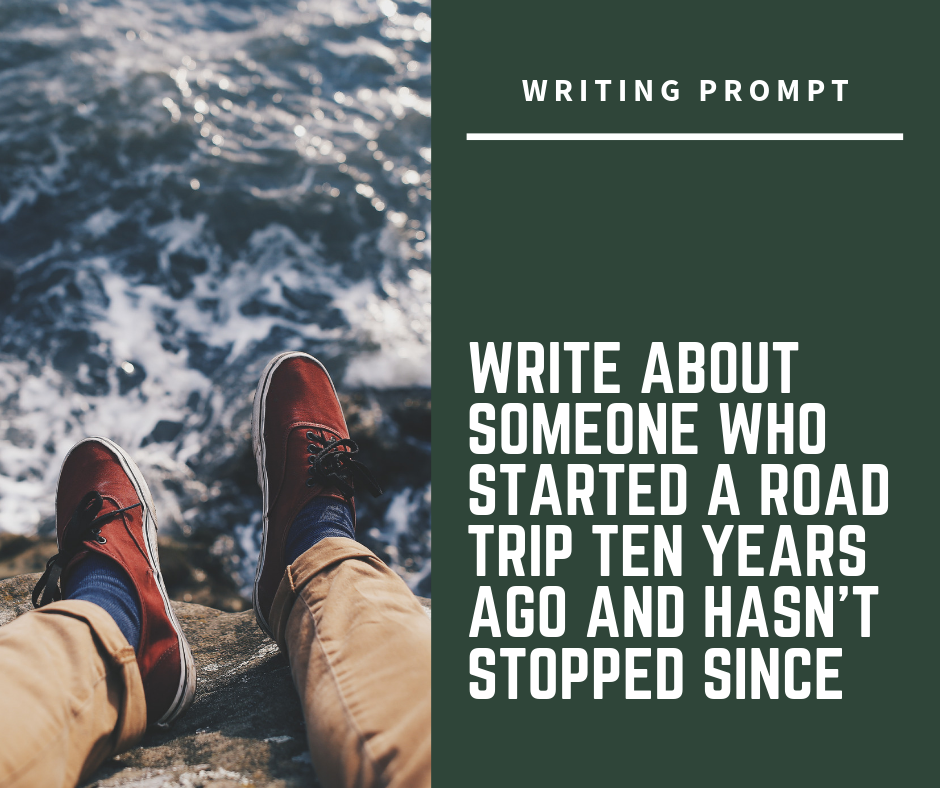
Dr. Cass is is a professor in the English and Modern Languages Department at UIS. Her works have appeared in Washington Square Review, Bluestem, Joyland Magazine, and others. She is also the faculty advisor for the Alchemist Review.
If you could have lunch with any author, who would you choose, why, and where?
Dead or alive? Anything? Oh wow. I think I would want to have lunch with– I feel like I get asked this question like, this is like the writer party question that always comes up for some reason. I think I would want to have dinner with Adrienne Rich I would love to talk to her about– because she’s such an intentionally political and feminist poet. I would want to like talk to her about how artists are working in our current political climate and kind of how poetry can make a difference within that so I’ll say zombie Adrienne Rich.
What is your favorite thing you’ve written and why?
Oh, you’re asking me to choose between my children! Uhh, oh man, okay, I think my favorite thing that I’ve written is this story in my first book, it’s called Jews and Sports and it’s about growing up in a kind of anti-Semitic town, I was raised Jewish and our temple was defaced when I was 12, like spray painted swastikas all over the temple and like so a group of us, like my dad and my siblings and I went in the morning and washed them off the wall and it was like a really vivid memory from my childhood and I tried to write about it in MFA school like in a story and it just was this really like kind of dogmatic story and like it just felt like it was trying to be an essay about anti-Semitism rather than like a piece of fiction and so I like put it away in a drawer for a while and like I went and did my PhD, and like I didn’t really think about it and then a year after I finished my PhD I was working on, like I was trying to work in a more focused way on these stories of like sports and games that make up the book and I remembered this book that my dad got my brother because there’s not a lot of Jewish athletes in like American culture and it was called like Jews and Sports and it was just like this catalogue of Jewish athletes to help my brother feel like he could be an athlete and it just wound up in our bathroom so it was like always in the bathroom and like , so I started writing from there and it turned out like the scene of the defaced temple popped into the story and it was totally right like where it was and it clicked into place and, and I think it’s meant for the story because of the magic of that, like sometimes you write something and you’re just not ready to write it yet and like I’m really glad I wrote the draft in my MFA because then it was like in my head but like yeah it wasn’t like I took out my old draft or anything, I just knew that I needed to rewrite that scene and it just came to the new draft and then it became a story that like meant a lot to me emotionally and, as well as in terms of like the book so like yeah, I think that would be my favorite one.
How do you know when a work is ready to be sent out to be published?
I feel like I’m going to give the cliche, annoying, answer, which is just like it feels like, it’s kind of a gut punch, like you feel it, like you reread it to yourself, like I always read my work out loud and when I kind of get to the end and when I feel like that sense of the piece is doing something to me, like when if I’m approaching it more objectively as a reader and I feel like it’s moving me and I’m excited to share that experience, that’s when I know it’s ready, so, also, like usually like before that happens, I get feedback from folks I went to school with so even if I feel like “oh, this is ready to go”, I’ll usually like make sure to get feedback from people to see like what things I’m missing, or you know, one more round of that. Yeah, or like I’m editing the same paragraph over and over again, so then it usually needs to leave my presence in some way.
What was one surprising thing you learned in creating your book?
I learned, when I was in the copyediting stage that like I’m really drawn to images of space and space travel and I think it’s partly to do with my father, is like, he was like obsessed with space travel when we were kids, he’s a math teacher, and he did like all of these units involving like calculating distances between planets, and like he went to like NASA for teachers and like so, but I’d had no idea that those images were so persistent in the stories until I read all of the stories at once and then I was like “Oh! There’s a lot of like planetary thing”, kind of cool to see how that vocabulary was like subconsciously filtered through. Also, I think just realizing more broadly like how much being an athlete shaped my identity and the identities of people I’ve known, how much of it was a form of love and communication and community building as much as it was also a source of stress and like negativity and really like, tough love kind of individualistic, patriarchal kind of way of thinking about people, so like I had no idea that my first book was going to be a sports book. Like if you had asked me in MFA school, like I was planning to write like surrealist fairy tales and some of them kind of are, even though they’re about, like sports is the subject matter, but like yeah, I didn’t write any stories of this nature like up until the very end of my PhD, so just that that was something that was moving and like haunting to me was a pretty huge surprise.
Why is literature and writing important to you?
I think, for a few reasons. It helps me to keep challenging my ideas of myself, of the world, of the narratives that I think I know. When I’m write well, my stories are taking me unexpected and uncomfortable places so I think it’s just this really critical way for me of engaging with the world and engaging with my own sense of identity and how, I feel like, and this is something Dorothy Allison writes about, like it’s really hard to hide from yourself in fiction, which sounds kind counterintuitive because you’re writing about made up people who are not you, but like you bring yourself to those stories and like for me, if I’m lying to myself about something or not looking closely enough at something, like I can see it in the writing and so I think it helps me hold myself accountable to myself too, so I guess those things, and also it’s a really fun way to move through the world, like noticing how interesting people are, the language they use, and it’s just people are so weird and wonderful and like writing, when I’m like writing consistently I’m so much more awake to that and like open to it and so I really feel like when I’m not writing, it just feels like things are dulled down, and then you’re just like oh, where’s my notebook, like that’s hilarious, or like yeah that kind of intuition kicks in, that way of paying attention, so yeah.
Do you have any advice for aspiring authors?
Let’s see, um, I feel like the answers that you usually get are like read a lot, show your work to people, like revise a lot, and those are all good but I think for me, like something that’s been really important is the idea of fighting perfectionism however you can. When Megan Giddings was here a few weeks ago, she was talking about how when was was like working full time, her writing for that day was just like describing the cafeteria that she’s always in and it just like clicked in my brain, yeah, like sometimes we’re not always our ideal writerly selves, we’re not always like “I’m gonna spend three hours a day, like with my cup of hot tea and like in my silent place”, like a lot of the times, writing practice has to be kind of scrappy because you’re busy and I think at various times in my life this idea of the perfect writing routine has kept me from writing and like, so I would say, find a method for, it’s kind of like if you can’t play your sport for a long time but maybe like you keep a tennis ball in your office and every once in a while you like kick it against the wall, you’re like keeping that intuition, that muscle alive in the way that you can, and sometimes like that collecting of stuff is really good and like I think you always need a pool of images and language to draw from in fiction so it’s only going to enrich your work even if that day, like something you heard in the hallway, like a weird piece of cake that you had, whatever, like that’s, the action of writing it down, like makes it something that, for me, like it makes it something that my subconscious is going to remember, like that’s in this notebook, and like if and when I need it in a story, I’ll be able to access it better than if I didn’t write it down at all.
Dr. Webb is is a professor in the English and Modern Languages Department at UIS. Her publications include: “I’ve Never Experienced White Guilt, “Colorism in Police Killings of Unarmed Blacks: A Retrospective Descriptive Analysis from 1999-2014,” “Mentions and Melanin: Exploring the Colorism Discourse and Twitter Culture” and others.
If you could have lunch with any author, who, where and why?
Right now, I would have lunch with- do they have to be alive? No?- right now I would have lunch with Gwendolyn Brooks because she wrote the book Maud Martha which is currently my favorite book. I wrote my dissertation on it and I love how it’s written in vignettes, it’s like a poet’s novel, right, so it’s not a traditional narrative, it feels more like prosaic poetry and I really identify with the main character, Maud Martha so I would want to pick her brain about how she developed that character, what it was like being a poet who crossed over into another genre, that sort of thing.
What inspires you to write?
Everything, usually. Just interesting ideas, and they can come from anywhere, and interesting conversations, or a beautiful landscape, that sort of thing. So writing for me is a way to think and that’s kind of where my inspiration comes from, if I’m trying to think about something or ponder on something, writing is my favorite way to do that.
Who would you want to write your biography and why?
I would want- I almost said Stephen King cause I feel like he would, I feel like if Stephen King wrote it they would probably turn it into a movie and have it be really dramatic and a lot more interesting than my life actually looks. But I think also maybe Alice Walker or Toni Morrison because I like the story that they’ve told about black women, you know, in the past, that sort of thing. I feel like they would understand some of the essence or like the spiritual, psychological of my life so I think they’d be good.
What’s your favorite thing you’ve written and why?
I think my favorite thing I’ve written is a blog post called Brave Love and it was my most personal piece of writing I’ve published and it’s the one that people respond to the most, so I think that’s why it’s my favorite because people say like I’ve got an email from someone saying “thank you so much for writing this, it really relates to my story” and that sort of thing, so because of the effect it’s had on people it’s my favorite.
Why is literature and writing important you?
Well, I could say it’s the one thing I’m good at. So I think it’s the way I think. I used to be an architecture major but I didn’t do well in architecture school, I almost flunked out, and so for me it’s important because it’s my best way-mode- of communicating and connecting with the world, and engaging with the world, and it’s just been a part of my life so long, I couldn’t imagine myself not reading, for sure, and then writing.
What’s one piece of advice you have for aspiring writers?
Okay so I’m going to say a couple of things. A is to write as much as possible and read as much as possible. I just put this quote up in my classroom on Monday, Stephen King’s advice is to read a lot and write a lot. You can only get better if you write a lot, and writing a lot doesn’t necessarily mean publishing a lot, so you might never do anything with what you write and you might have a whole journal full of stuff that no one else ever sees, but it’s the act of writing that helps you get better. The other thing I would say is writing is a skill that can be learnt. So don’t think that oh, someone gave me bad feedback this time around, I must not be a good writer. Or they rejected my poem or my play or my short story so I must not be meant to do this. I would say persist. So even if you’re not achieving the success you want, however you define it, right away, don’t give up. If you really feel like you’re a writer, then continue to write, continue to share it with people even if you aren’t the next J.K. Rowling. Your voice matters.
Professor Whalen is an instructor in the English and Modern Languages Department at UIS. Her works have appeared in Gulf Coast, Southern Indiana Review, Fugue and others.
If you could have lunch with an author, who would you choose and why?
I mean really, when I first started with poems I fell in love with this poet Frank O’Hara, so I don’t think I could pass that up. And I don’t know, maybe just like a lunch counter on a New York street, that’d be cool.
What is your favorite thing you’ve written and why?
That’s hard. I think, my favorite thing I’ve written and why. I guess I should say the thing I’m currently working on, right, that seems like it might want the muse to keep speaking to me, and all that. So I am working on a project that’s based off the letters between Vincent Van Gogh and his younger brother Theo Van Gogh, and it’s been really cool. It’s taken a very, very long time, but I’ve enjoyed it cause it’s kind of surprised me, where it would go, I originally thought it was something I was going to spend a couple of months on and it would be a chapbook, and now I’ve been working on it for years, and it’s an 85 page manuscript, so it’s kind of shown me a lot of the things I love about poetry- that it can take many forms, and that it can tackle many things, and take many shapes. So yeah, probably that.
Why is literature and writing important to you?
I think– I mean, human expression is of course important right, and that takes many different forms and then what we do in writing is just one way of expression. I particularly liked it when I first started doing it because there was something about the relationship between the writer and the reader that I found really compelling and very intimate and close, you know, like we were even talking about in Brit Lit today, having this idea where it’s like characters turn away from each other but turn to you, and tell you what’s going on, right, something about that interiority, I’ve always found compelling. Yeah, I like that and, of course, reading, right, reading and studying literature, you know, is great because you learn about people and of course, it increases empathy, and you kind of get to go places you don’t normally get to go, and yeah, so it’s important for that.
What genre do you most enjoy and why?
So I mostly write poetry. I enjoy it cause it’s kind of free and wild and it’s a place where there aren’t a lot of rules or parameters. And again, when I was a young writer I thought poetry was like the thing you do when you don’t have time to do other things, you know, like, I can’t write a novel, I’m an undergrad, so I’ll write poems, you know, and then I fell in love with it, and I think part of that was again, that relationship with the reader, I felt like I could kind of expect more from the reader, if that makes sense, that I could kind of make more leaps, and they could go stranger places with me, that I hadn’t experienced in other genres. So I think that’s a cool thing about poetry and I think it really breaks down these ideas we have about like the mind and the heart being two separate things; I think poetry kind of continually teaches us that you know, thinking and feeling is the same thing and you know, like the beauty of that.
Who would you want to write your biography?
I don’t know. I don’t think I know a lot of biographers, uh, that’s a good question. Has anyone else answered these yet? No? Yeah, I’m not sure, you know, I’m totally not sure. I also kind of am like, the idea of even having a biography makes me cringe a little, like ugh someone’s going to go through my stuff, yeah, but that’s just me. I guess maybe if I’m not around anymore then yeah, but yeah, I don’t know.
Do you have any advice for aspiring writers?
Yeah, I think I would say, pretty cliche, read a lot, but also read kind of diversely, and to seek out things that are different than your aesthetic sensibilities or what you normally gravitate to and to kind of challenge that. And then maybe a second bit of advice would be to just kind of trust yourself. I think when you’re first learning to write and you’re in a workshop and there’s kind of a lot of rules and people talk a lot about what you can’t do or you know, what isn’t working and I think that can be a little limiting sometimes so just, if you have an idea, trust that it’s a good one and see it through.
Hi y’all!
November is a hectic month! I hope you all have been able to keep up with your writing! It has become very clear to me that National Novel Writing Month was not intended for college students and if you are a college student and complete the challenge, you can color me impressed!
I think it is important to remember, especially during this time of year, that writing can take the form of many different things. It is not just a word count, even though marking words on a page is really important. Writing can be as simple as listening to conversations at a coffee shop or listening to your new favorite song on repeat. Writing is falling in love with a word, its texture and look on a page. It’s trying to fit that word in what you are working on. Sometimes, for me at least, writing is staring out into space, daydreaming. Some of my best idea’s have come from something as simple as watching a movie and talking about it with friends. Sitting down and creating a work of art has to come from inspiration, making room for being inspired is so important.
I realize that what I have just said makes writing sound very romantic, but sometimes writing is dirty and hard. Revision is really difficult, and probably the worst part of writing, at least in my humble opinion. This is followed closely by getting feedback from readers. This is writing too and it is just as, if not more, important than creating a word count. During workshop, sometimes it is really tough to hear what people have to say about my narrative, but I have gotten some really good idea’s from that. It is all about improving what you have and growing as an individual. Understanding what your audience see’s is essential to the craft.
Now it the time where I would usually share some of my writing, but instead I’m going to so list some of the things that have lead to new idea’s for my narratives or completely new stories.
Writing encompasses many, many things other than the physical act of writing. That is why it is art!
Good luck with your writing this week! Please share your favorite writing habits!
Kayla
We are so excited for the open mic night in just a few short days! Building and connecting the literary community is what it is all about! We hope to see y’all there!!
